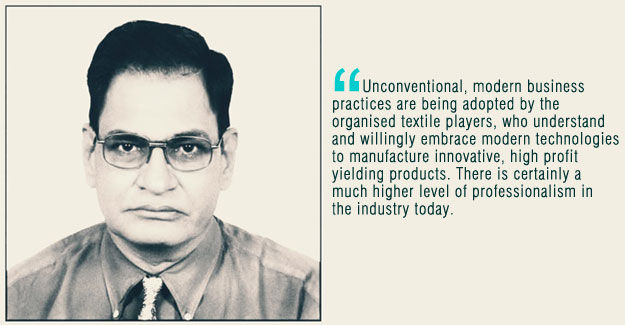
How To Be A Successful Textile Professional
Ramesh Gosai is a well-known name in the Indian textile fraternity. He has worked in various textile mills, at Bombay Textile Research Association, at Gherzi Eastern, among others, and now is a consultant to some textile companies in India and the US. A career spanning 45 years, he has many interesting insights and anecdotes to share, that give a better understanding of how to successfully build a career in this industry. "Talking about my entire professional career, I would say it was unique, exciting, tough, challenging and provided lots of opportunities to learn and grow." He relates how he handled his first challenging assignment as production supervisor, where he had to deal with adamant workers to produce results. "I realised I would have to prove to the workers that I know more about machines and technical aspects that they did. So I learnt about machine engineering, its functional principles, how to repair the machines, and relationship of each mechanism with principles of textile weaving technology. Second, I studied labour laws so I could take due legal action against the mischief makers. I also learnt labour psychology to understand why workers tend to misbehave. Equipped with this knowledge, my task of controlling labour and obtaining desired results from them was made very easy, and I was successful in the first stage of my career. I have seen that people usually fail at this stage and opt for marketing and other such activities." "To move ahead on my career path, I realised I needed to learn better about the working of allied sections like weaving preparation, spinning, fabric processing, production planning/ quality management, utility management, material management etc. This knowledge led me to the position of production head," said Mr Gosai. Moving further up the career path to become profit centre head, he had to get a good grip on commercial aspects like costing, marketing/purchases negotiations, inventory and cash flow management, MIS, company laws, Factory Act, etc. "Just getting the knowledge and doing the task was not enough. I was a keen observer of working styles, and I was fortunate to be given the opportunity to hone my skills. In a nutshell, practical knowledge, ability to learn new things, analysing and understanding and learning from bosses' working style - all this is necessary for success in professional career." Changing face of the textile industry According to Mr Gosai, textile is a very complex industry in many ways. It has very long process chain/batch process with lot of different types of raw material/finished products, each demanding entirely different process and technological parameters. It is highly labour oriented with lots of human interfaces affecting end results. It requires involvement of all (mechanical, electrical/electronic /instrumentation, air, atmosphere, human) branches of engineering as well physics (fibre and motion) and chemistry (sizing, fibre/yarn/fabric processing) too. It is technology (spinning), science (processing) and art (weaving/knitting and garmenting/making up). "This is an evergreen and much more fashion oriented industry today, slowly moving towards intelligent and performance wears. Further and particularly with more and more advancement in all 12 branches of technical textiles and nonwovens, it will become an important industry for all other industries," he believes. Unfortunately, the industry even today operates in the age-old methods. "Ninety percent of textile production is still in the decentralised manufacturing sector which continues to follow conventional business style - adopting unethical means of generating profits. And in the process, giving very stiff and unfair competition to those manufacturers who genuinely want to produce quality and innovative products. This is an unpleasant situation, which will impact the trustworthiness of 'Made in India' brand. It is my personal opinion that the sooner this kind of unethical businesses die, the right industry will develop faster." He is heartened to note that unconventional, modern business practices are being adopted by the organised textile players, who understand and willingly embrace modern technologies to manufacture innovative, high profit yielding products. "There is certainly a much higher level of professionalism in the industry today." “Practical knowledge, ability to learn new things, analysing and understanding situations, and learning from the working style of your superiors, - all this is necessary for success in any professional career.” According to Mr Gosai, the role of textile education institutes cannot be ignored for building a modern, professional industry. But textile institutes in India need to discard their age-old curricula which are not relevant for the industry. According to him, these are a few things that textile academic institutes need to do:
- Omit teaching age old technology and ancient machines. Concentrate on modern technology and machine. Teach machine repairing also as practicals.
- Teach basics of mechanical, electrical/electronics/instrumentation, air, humidification/refrigeration engineering.
- Teach basics of labour laws, company laws, industrial economics, product costing, etc.
- Induct some lectures on modern problem solving techniques like Just in Time, Zero Defects, Quality Circle, industrial engineering, data analysis & trouble shooting.
- Regularly invite professional technologist/industry experts as guest lecturer to share their experience, problem solving techniques. This knowledge cannot be found in text books and brochures.
- Try to give what industry wants and not what you produce. Thus academic institutes must regularly interact with expert professionals and industry players, take their feedback and suggestions for fixing textile curriculum & make corrections accordingly. This should be done at least every three years.
- Try to produce future managers for industry and not only technocrats. Technocrat can grow up to position of production head and not as factory/profit centre head. Today's techno-commercial manager can be a future entrepreneur too.
- Most importantly, teaching faculty must have minimum three years' practical industrial experience working on shop floor.
Textile Excellence
If you wish to Subscribe to Textile Excellence Print Edition, kindly fill in the below form and we shall get back to you with details.












